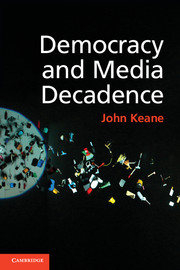3 - Media decadence
Published online by Cambridge University Press: 05 June 2014
Summary
Given the positively self-reinforcing novelty of communicative abundance, it is unsurprising that more than a few journalists, media industry figures, politicians and citizens wax eloquent about the thrilling ways in which the new media revolution is fundamentally altering the landscape of our lives, and our politics, often for the better. Contemporary events – exemplified by the global occupation movements that spread from the media-fuelled uprisings against dictatorship in the Arab world during 2011 – are often cited as confirmation of the trend. The pundits have a point; they seem to have history on their side. Expanding information banks, public exposés of the corrupting effects of private and secretive power, enhanced political representation and expanding cross-border publics are important democratic facts of our time. Their technical basis and political originality, along with their power-chastening effects, should not be underestimated. But they should not be worshipped.
The opening phase of the new communications revolution, as we have seen, produced a giddy sense that freedom of communication and monitory democracy would win the world. Plenty of industry insiders remain utterly convinced that this is what is happening. Ponder the words of Pierre Omidyar, founder/chairman of the eBay auction site: ‘We have technology, finally, that for the first time in human history allows people to really maintain rich connections with much larger numbers of people. It used to be, your connected group was really your immediate community, your neighborhood, your village, your tribe. The more we connect people, the more people know one another, the better the world will be.’ Hear the prophecy of Bill Gates that ‘the Internet is becoming the town square for the global village of tomorrow’. Or sample the spirit and substance of remarks by Micah L. Sifry, co-founder of the Personal Democracy Forum, who insists that ‘we now live in an age of abundant public energies, in addition to abundant information’ because ‘abundant information, connectivity, and time are just the technical ingredients needed to foster an explosion of civic activity’.
- Type
- Chapter
- Information
- Democracy and Media Decadence , pp. 109 - 190Publisher: Cambridge University PressPrint publication year: 2013



